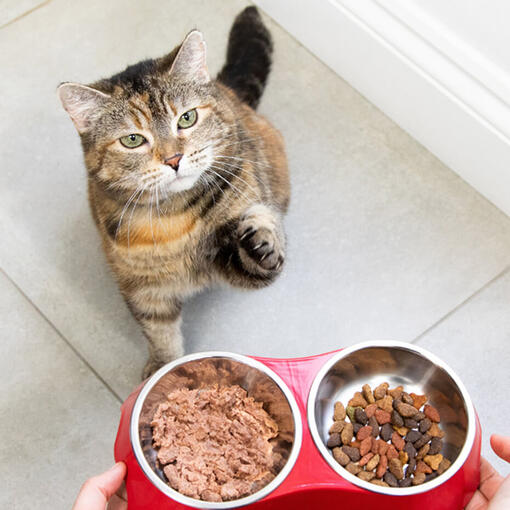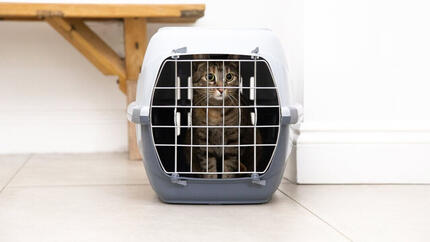
If you’ve got a feline friend, or you’re thinking of getting one, you might be wondering how long do cats live for? Domesticated cats can live long lives, but their life span is dependent on many different factors.
For example, a cat’s breed and whether they’re indoor or outdoor can impact a cat's life expectancy. Their lifestyle, what they eat and how much they exercise can also make a huge difference to how long they live.
On average, household cats in the UK live to around 12 years – although some domestic cats can live to 20 years old, with the world’s oldest cat living to 26! This average age is the equivalent of 72 in human years, using our cat to human years calculator!
Thanks to continuing advances in veterinary medicine and science, cat life expectancy has increased and so our cats can hopefully stay healthy and happy for longer. Read on to discover the factors influencing cat lifespan, including indoor vs. outdoor living, breed, and lifestyle choices, as well as practical tips for maintaining or even increasing your cat's life expectancy.
Outdoor vs. Indoor Cat Life Expectancy
How long do outdoor cats live?
Outdoor cats love to explore and get into anything and everything. Unfortunately, this does come with risks which can shorten their lifespan – especially for those who live in urban areas.
Outdoor cats are more likely to get stolen, lost, rehome themselves, get run over, eat something they’re not supposed to (like poisonous plants) and get into fights with other cats.
To reduce these risks, consider building an outdoor area for them in the garden (catios) where they can still enjoy the great outdoors but are still secure and so safe. There are also ways to fence your entire garden with specially designed ‘cat proof’ fencing that will prevent your cat escaping from the garden – and any visiting felines from getting in.
There are benefits to outdoor living for cats however – in that they will generally get more exercise, stay far more agile and not be so prone to weight-gain – all of which impacts positively on life expectancy.
How long do indoor cats live?
Indoor cats spend most of their lives inside our homes. An indoor lifestyle may suit some cats and knowing that they are warm, comfortable and safe, can be reassuring for owners. Indoor cats encounter fewer hazards than their outdoor friends, with no cars to contend with, no territory to fight over and fewer other risks too. Because of this, it’s thought that cats that are kept inside usually live longer.
So, on average, how long do indoor cats live for? Well, estimates vary, but many vets say that indoor cats have an average life expectancy of 12 years, depending on breed and type.
Owners of some cat breeds, like Persians for example, feel that they are better suited to an indoor lifestyle – and of course, many of the glamorous breeds are a huge theft risk if allowed to wander out and about. Some indoor cats can go outside under supervision, in an enclosed garden with their owner close by or even in a ‘catio’, a specially designed run for indoor cats to have safe access to the great outdoors.
How long do tabby cats live?
A cat’s life expectancy can depend on the breed – and tabby cats can be found in a variety of different breeds. Domestic shorthair tabby cats are numerically popular felines, so how long do these tabby cats live?
The average life expectancy of a domestic shorthair tabby cat is between 12 and 15 years, but some can live until they are 18 or older.
Other cat breed life expectancies
Some studies have found different results. According to Cats Protection, pet cats have an average life expectancy of around 12 years. They also found that purebred cats had a lower lifespan, which may be attributed to an increased risk of hereditary illnesses. In a recent study (2024) from the Journal of Feline Medicine, the longest-lived purebred cat in the UK was the Burmese (14.4 years), with the shortest being the Sphynx with an average life expectancy of 6.8 years.
How to increase your cat’s life expectancy
Now that we know how long cats live, you’re probably wondering if there’s any way to increase their time with us. Of course, we want our furry friends to live as long as possible and with the right love and care, you can increase your cat’s chance of living their life to the fullest. Here are some ways to help maintain or increase your cat’s life expectancy:
- Vaccinations – getting your cat protected from diseases can prevent illnesses
- Vet checks – we all need a check-up every so often and the same goes for your cat
- A healthy diet – a balanced diet, with high-quality, nutritious cat food, keeps your cat fit and healthy. According to Cats Protection, lifespan is reduced by 0.02 years for every 100g a cat is above their ideal weight.
- Keeping them warm and safe indoors at night
- Microchipping – in case your feline gets lost, microchipping them increases your chances of being reunited
- Exercise – keeping them fit and agile is important for feline health
- Environmental enrichment – cats need an opportunity to be able to climb, jump, chase, hunt, and pounce in order to be healthy and happy. They also need to feel safe and secure – so have easy access to food, water and litter trays (if used) without competition or stress.
While we have seen that a cat's average lifespan is about 12 years, this can be influenced by a variety of factors. By providing a safe and enriching environment, a balanced diet, regular veterinary checkups, and proactive attention to potential health risks, you can help your feline companion live a longer, more fulfilling life. Finding out how long cats live is great for learning more about our feline friends. If you’re looking to get a cat, and want to know how to make their first nights in their new home comfortable, you can find out all you need to know with our article on what your new cat needs.











